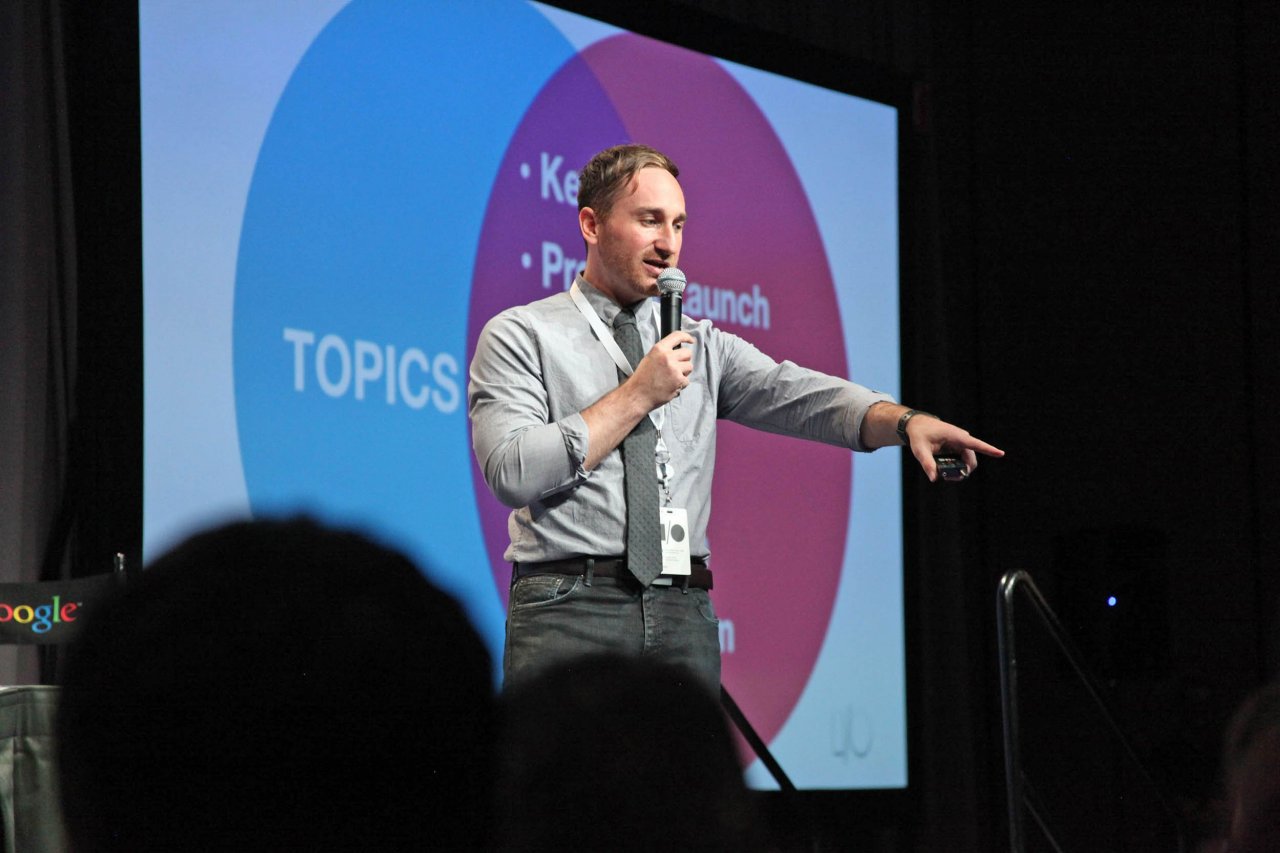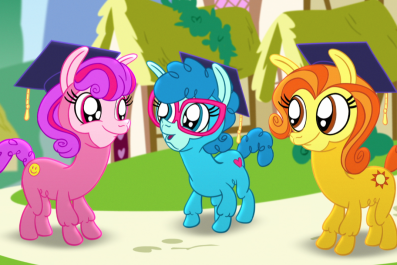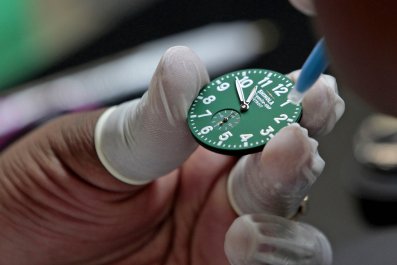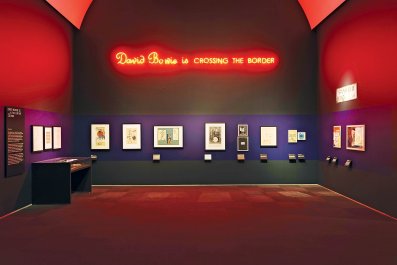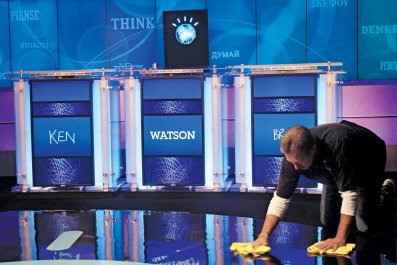What's funnier than a PowerPoint presentation? You might be thinking a tour of your municipality's sewer system, or watching the international weather channel, but Sammy Wegent is not like you. Wegent, a senior game writer at Zynga in San Francisco, was sitting in a meeting watching a PowerPoint presentation (one of the estimated 1.26 million given each hour around the world) when it reminded him of something else. "When someone is up there giving a presentation, it's strangely like they've doing a stand-up routine," he recalls of that moment. "They're not trying to be funny, but it looks like it at first glance."
And then there is the screen. "There's so much potential for jokes to be in that," he says. "Or when people mess up, they expect a slide and it doesn't change, that awkwardness—that would just make me laugh.... I thought, This is so ripe for satire."
Satire, as George S. Kaufman famously observed, is what closes on Saturday night. What Wegent—who, when he's not writing new FarmVille plots at his day job, also works as a comedian, actor and teacher—wanted was something that would play on Monday morning. He wanted to bring the comedy to the office. Speechless, the PowerPoint improv show that grew out of that brainstorm, was originally just an evening of audience participation comedy in which the tech-heavy crowd could join in the merriment by suggesting absurd products and brand names for a quartet of presenters (comedians and volunteers) to pitch. People's ability to think on their feet was challenged when they would click the pointer and get a picture of a mushroom cloud or Tyler Perry's Madea character. It was a good way to blow off steam for a bunch of people who had seen one too many PowerPoint presentations, probably that day, and the show was an immediate hit. Call it nerd karaoke.
But Wegent (who developed Speechless with co-producers Scott Lifton and Anthony Veneziale) thought improv comedy had lessons for the working world. After bringing a version of the show to Google I/O (the company's annual software-developer conference in San Francisco) last year, Wegent, 35, noticed that many of the people making these PowerPoint presentations all over the world weren't very good at it. "A lot of people are afraid of public speaking," says Wegent. We are sitting in a white conference room in the Zynga offices because the lunch area, designed to resemble an old-fashioned penny arcade with literal bells and whistles, was too damn noisy. "Through Speechless—our training, our show—I want to demystify it. We all have something to say, we all have great stories, we're all pretty funny in some capacity, even if it's just with one person. How do we harness that?"
Natalie Villalobos is Google's Women in Technology advocate and runs the Women Techmakers program. Though the company has approximately the same male-to-female ratio as other tech companies (70-30), she believes in making women in the industry more visible—and audible. She brought Speechless in to do a pilot program for 25 women on the Mountain View, California, campus. At the end of the two-day workshop, the participants made videos of their presentations.
Deborah Tan, a data scientist who works on the people analytics team, liked that the training "got us out of our heads and kind of using our bodies more. Google is a data-driven company; we live the data. And often when we're making presentations the data speaks for itself. And when I brought this up in the training, that in presentations the data should speak for itself, Sammy said, 'Well, then why are you there?' And that was very powerful for me."
"These people are so deathly afraid of not being on script, the teleprompter going out or the slides not working," says Wegent. "Improv is about turning those mistakes into opportunities. We're trying to teach them [that] they don't need to know everything word for word. If you're the authority—you got flown by your company across the world to talk about this, in front of all these people because you're the authority—then why do you need all this written?"
Of course, building confidence takes time, and the tech world works very quickly. Fortunately, so does Speechless. "Some of us are really creative and good at connecting random pieces of information together to make it funny and interesting," says Elena Kon, who has been an engineer at Google for four years, about her experience at the workshop. "You could see people grow just in one day."
Metaphor is more the province of poetry than technology, but making leaps in language, if not in logic, is an important part of communication. One goal of the Women Techmakers program is to get more women interested in tech and to get women already in the field to talk to each other more. Being able to mix messages is not a skill that comes easily to number crunchers. So a woman talking about machine learning (a discipline related to the study of algorithms) had to think quickly when one of her peers hollered, "Cupcake!"
"And then you have to say, 'Machine learning is like a cupcake because…'" says Kon. "They put you on the spot to create something. He had us do a mock presentation where he had us talk about something, and the slide would give a visual of something totally unrelated, and you're supposed to talk through it. So you'd be like, 'I'm here to talk about the company's strategy' and this next slide would be the image of a pig or something. And you have to say, 'Our company's model for next year is like a pig.… '"
The anti-capitalist may be inclined to agree, but Wegent's message is not subversive; he merely wants people to feel more comfortable and avoid the epic fails that are the stuff of tech conference legend. He is constantly amazed at how little preparation is given to these company presentations. "The stakes are so high when someone has to present for their job, but their preparation time is so low," he says. "It's such an imbalanced scale: 'I have to give this talk, and my job is on the line, but I'm not going to practice it; I don't want to think about it, and I'm gonna write it the night before because I'm so terrified.' That doesn't seem like the best way to go about this."
With Speechless, Wegent sees his different worlds colliding. "I'd done corporate comedy for a while," he recalls. "These gigs are good money-wise, as opposed to doing a bar that doesn't pay you… When I was doing stand-up, the company would have a lawyer come and vet the material," he says. "I understand why; it's a company setting. Comedy is about crossing boundaries and pushing buttons and corporate environments are not about those things. It's hard to be really funny in an environment that doesn't allow for disruption. So I thought if I can create an improv show where they can't vet the material because the material will not exist until we get there, then we're on to something."
One of the participants of Villalobos's pilot group complained that it's hard for her to speak up at meetings. "A lot of time at Google technical meetings there are a lot of men speaking really loudly," says Kon (to much laughter). So Wegent and his fellow instructors had the women hold a mock meeting, talking over each other, presumably, and then offered tips on how to deal with the situation.
"When you are silent the whole time it's really hard to all of the sudden speak up," she says. Wegent suggested they keep a hand in the conversation with relatively meaningless commentary ("Uh-huh," or maybe just "Yeah!") "By saying something small, when you want to speak you are almost halfway there," says Kon. "Or open up with something like, 'Oh, here's an idea!' Something that prepares you to talk about it and gets you attention."
Google is pleased enough with the experiment that it flew Wegent and company to Bangalore to work with some women in tech in India. How will this quintessentially American form of performance art travel? What might be lost in translation? Wegent will be happy if the people in Bangalore just relax. "I want people to realize they're just talking," he says. "You talk all day long.… If you don't have to worry about having every word memorized and you can just get up and talk, do a fake toast, do a fake product launch, do a fake sermon, there's no pressure. The content's never existed, and after you're done, no one's ever going to remember it."



